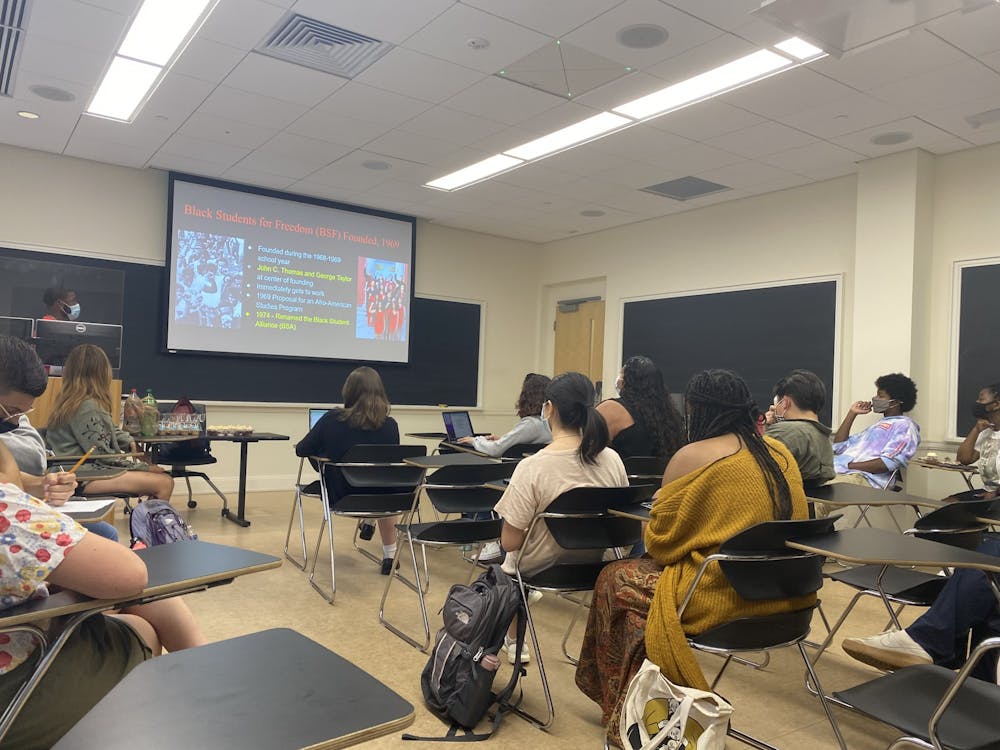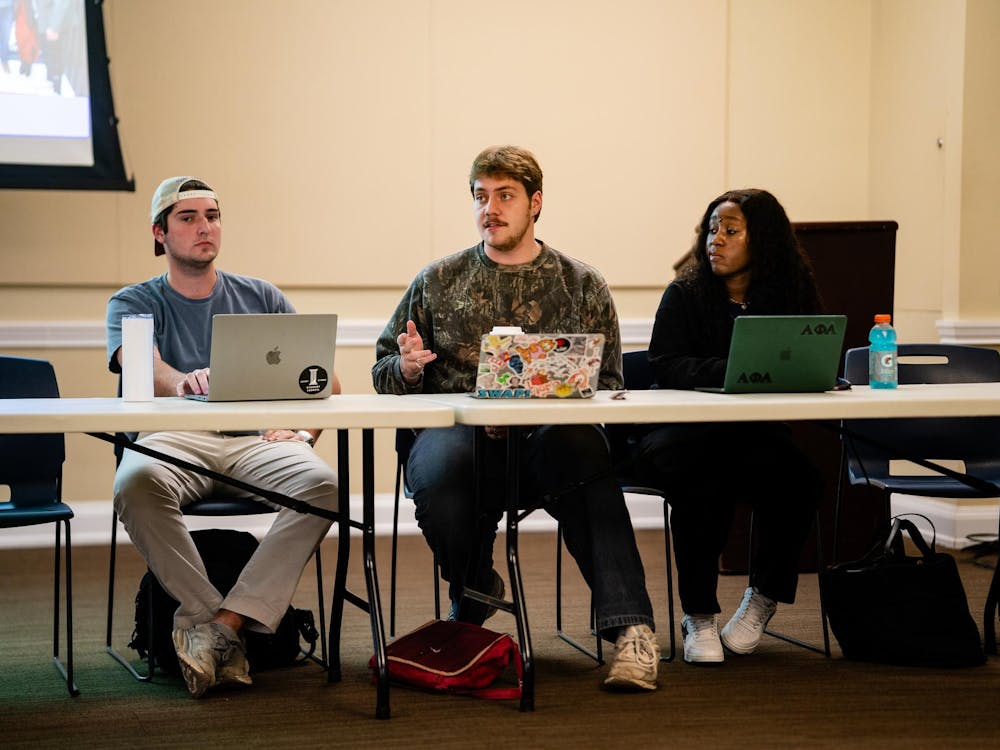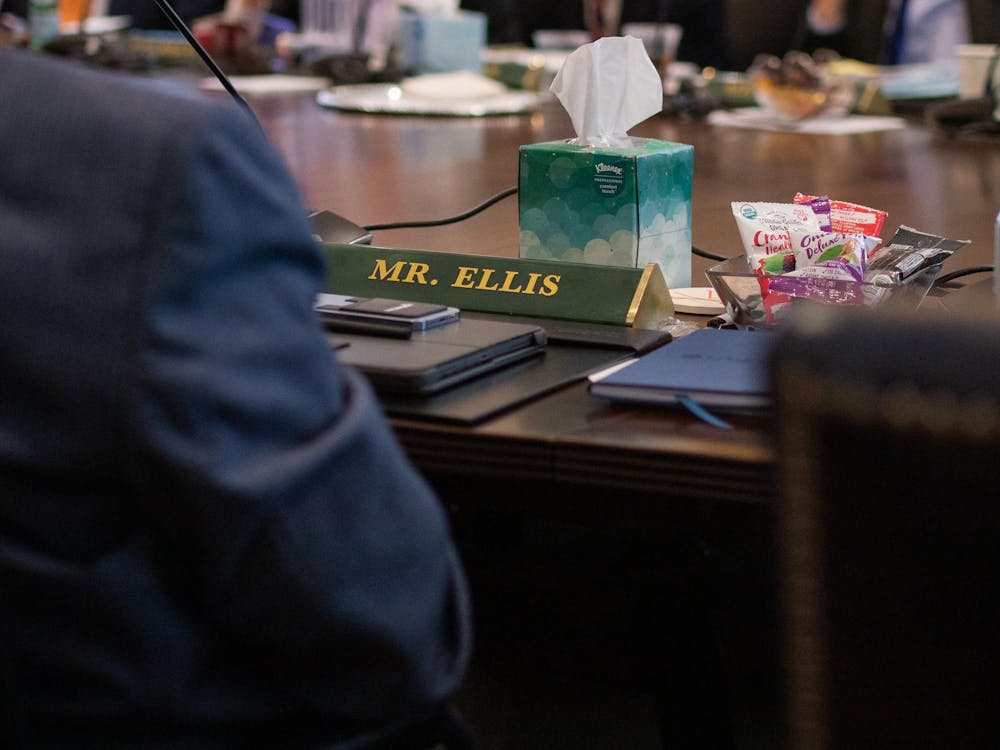Students from across the University gathered Monday in New Cabell Hall to attend the Minority Rights Coalition’s first Memory Monday presentation. The event — a collaboration between the MRC and Black Student Alliance — was attended by roughly 20 community members.
The MRC is an umbrella organization that encompasses student leaders and organizers representing various marginalized groups on Grounds. These groups include Asian Leadership Council, the Black Student Alliance, Cultural Organization for Latin American Students, the Middle Eastern Leadership Council, the Muslim Students Association, the Native American Student Union, Muslim United, the Queer Student Union, Political Latinxs United for Movement and Action in Society at U.Va., undocUVA and the Organization for African Students.
“We are committed to building community among ... marginalized groups by engaging in anti-racist, anti-sexist, anti-imperialist, and anti-capitalist resistance and collective learning,” said Abena Appiah-Ofori, MRC chair and third-year College student.
In a social media announcement about the series, MRC explained Memory Mondays serve to maintain a collective institutional memory of the University’s minority organizations’ histories, which can often be forgotten due to the four-year turnover of students. Institutional memory refers to information held by an institution’s members which provides an understanding of its history, culture and the stories behind its decisions.
Appiah-Ofori said she was inspired to start Memory Mondays after noticing how many of the University’s past student demonstrations are unknown to current University students, such as protests following law enforcement’s unjust beating of Martese Johnson in 2015 and the gatherings following the 2017 white supremacist attacks on Charlottesville.
“Most of the past student protests and calls to hold the University accountable have gone undocumented and are unknown to the current student population [and] even the leaders holding the positions that organized them in the past,” Appiah-Ofori wrote.
Open to all students, Memory Mondays will be a series of presentations held on Mondays throughout the semester. Each week, representatives from different organizations share presentations on their group’s history to document and build knowledge of student activism on Grounds. The project is also meant to be a call to action for those attending to support presenting groups in their efforts.
Through all Memory Mondays presentations, Appiah-Ofori’s goal is to foster spaces of education, compassion, advocacy and solidarity between the University’s marginalized students.
“My hope is to inspire current students to learn about the legacy of historically marginalized communities at the university in order to take informed action to carry on with the work of those communities and help make U.Va. a better institution for all,” Appiah-Ofori said.
During Monday’s event, Deric Childress Jr., president of the Black Student Alliance and fourth-year College student, kicked off the series and shared BSA’s history of activism at the University.
Childress Jr. first provided attendees with a brief overview of the history of Black individuals at the University, including Gregory Swanson’s integration of the University through his admittance and suing to attend in 1950, to Robert Bland being the first African American to receive a degree from the University in 1989 to the founding of the Office of African-American Affairs in 1976.
“OAAA was created because of the lack of continuity and the lack of openness that Black students have at the University,” Childress Jr. said. “It’s ultimately still standing today and is still thriving.”
Childress Jr. also noted the founding of BSA — which was then called Black Students for Freedom — in 1969 to provide a space for Black students to “embrace history, sociology and economics and arts.”
Since then, the organization has led a number of campaigns. One such campaign started in 2015 after Martese Johnson was unjustly beaten by officers with the Virginia Department of Alcoholic Beverage Control. The BSA composed a document titled “Towards a Better University” that included a list of 10 demands that sought to “improve the experiences of all Black people on campus.”
The 10 demands included “public statements encouraging discussion, recurring study of the Black condition at U.Va., an infusion of minority perspectives into curriculum, renovation of minority spaces [and] the Memorial of Enslaved Laborers,” Childress Jr. said.
Following the murder of George Floyd in May of 2020, BSA renewed its demands in a document titled “The Reiteration of Historic, Yet Unmet, Demands.” Today, only one of the demands — constructing the Memorial to Enslaved Laborers — has been entirely met. Unmet demands include the recurrence of “a study of the black condition,” erection of memorials in honor of Black history at the University and in Charlottesville and increasing the number of Black students, faculty and administration.
Over a decade ago, student activists first called for the construction of a memorial on Grounds to the several thousand individuals who lived, worked and built the University. Before the construction of the Memorial to Enslaved Laborers, the only commemoration of these individuals was a plaque dedicated to the “several hundred women and men, both free and enslaved” who built the University located under the Rotunda’s south terrace.
In 2009, the Student Council’s Diversity Initiatives Committee established a Memorial for Enslaved Laborers group, and in 2013 the President’s Commission on Slavery and the University became functional. The commission began designing the memorial in 2018 in conjunction with input from the BSA, Student Council and the University and Community Action for Racial Equality.
Though the memorial’s dedication ceremony was intended to be held in April 2020, the event was postponed due to COVID-19 until April 2021, when the dedication was held virtually. Today, the memorial stands as a gathering place for community members, students and visitors to reflect on the history of enslaved individuals at the University.
Childress Jr. echoed Appiah-Ofori’s concern with the lack of institutional memory of historic demands when discussing the University’s responsiveness to BSA initiatives.
“New students come in and they start from scratch... administration knows that, and all of them rely on that. So [we are not] holding institutional knowledge or being strategic,” Childress Jr. said. “They just don't want to do it. Most definitely.”
Upcoming Memory Mondays will include presentations from minority organizations such as the Asian Leaders Council, Cultural Organization for Latin Americans at UVA, Muslim Students Association and undocUVA. More information about the MRC and Memory Mondays can be found on the organization's Instagram page. Further information about BSA can be found on their Instagram and Twitter pages.







